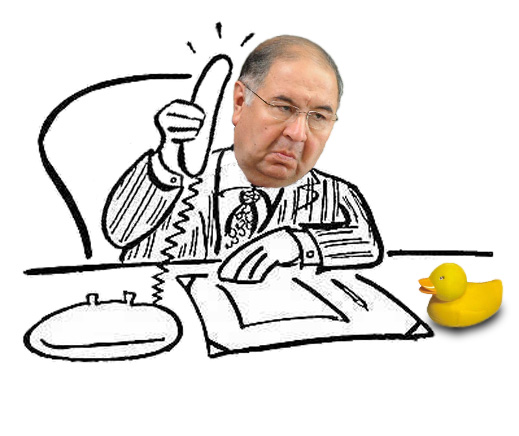
By John Helmer, Moscow
When it comes to interior decoration, no one does gilding better than Alisher Usmanov. And when it comes to serving delicacies to journalists, none cooks up the hors d’oeuvres better than he does. In the international stock markets, however, these qualities don’t quite cut the mustard. In consequence, in London this week Usmanov has set the Russian record for the number of attempts at initial public offerings (IPOs) or strategic share sales which have failed for buyers or price, or which he has withdrawn for related, if undisclosed reasons.
In between February and October 2008, there were at least two direct IPO tries for Usmanov’s Metalloinvest holding of iron-ore mines and steelmills, and one reverse listing attempt with Kazakhmys. In 2010 there was an attempt at selling a stake to Mitsui, and then a reverse listing negotiation with Nathaniel Rothschild’s ill-fated Vallar; both misfired. Between 2010 and 2011 another London Stock Exchange (LSE) bid was tried. Add to this reckoning the 2003-2004 negotiation with the Anglo-Dutch steelmaker Corus; abortive schemes to add Ukrainian and Kazakh iron-ore assets to his Mikhailovsky and Lebedinsky mines; and a national metals champion plan to merge with Norilsk Nickel and Rusal in 2009.
On Monday Usmanov’s telephone asset Megafon cancelled its Moscow debut presentation for what had been expected to be the roadshow for a share sale on the LSE. Doubts about the saleability of the shares had dented demand and cut Megafon’s valuation substantially over the past fortnight. By way of explanation, Megafon has despatched this statement to selected investment houses and media: “OJSC MegaFon today announces that it expects marketing for its planned IPO to commence at a later date. The schedule for the completion of the prospectus including recent M&A activity and the UKLA review and its proximity to the release date for the Company’s Q3 results has led the Company to opt to include those results in the IPO prospectus.” No new date has been fixed. Since the capital markets close early in December for the New Year holidays, the IPO isn’t likely to be re-tried until next February or March, if then.
Valuation was just part of the share marketing problem Usmanov encountered. He and his advisors were hoping for a top-of-the-range valuation of Megafon of $16 billion. Uralsib Bank in Moscow fixed the valuation at $13 billion. VTB proposed a range of $12.6 billion to $15.1 billion. The market evidence is that the maximum valuation offered for Megafon was $11 billion. Also, the initial IPO plan called for the sale of a 20% shareholding, roughly half from the Sweden’s TeliaSonera, and half from treasury shares owned by a Megafon subsidiary. Lack of demand and price support strategy cut the shareholding for sale to about 15%. What has been happening over the past month was that, compared to Usmanov’s peers, Mikhail Fridman’s Vimpelcom and Vladimir Yevtushenkov’s MTS, the discount kept growing.
When this was already becoming clear, the Megafon board announced on October 15 that it would buy two 25% stakes in Euroset owned by Alexander Mamut – one directly for $590 million, and one indirectly, after Usmanov buys a 25% stake first, for $710 million. The transaction sequence appears to generate a sizeable profit for Usmanov.
Mamut had failed to execute himself a London IPO for Euroset in April of 2011. That Mamut and Usmanov would close their deal in the middle of Megafon’s IPO is unconvincing. That they had attempted to finalize the deal earlier had been blocked by the refusal of the Federal Antimonopoly Service to give a clear okay. Market sources suspect the deal announcement was timed last week to create the justification for postponing the Megafon share sale, and trying again to improve its valuation and share price.
Megafon was reported by Bloomberg as claiming: “investor engagement in the investor education process has been exceptionally strong.” According to the well-known Bloomberg formula for inside information, Megafon “is determined to complete the IPO before year- end, with the delay postponing the planned sale by a few weeks, according to two people familiar with the matter. The shares may start trading in late November or December, they said.”
For Usmanov, the London public relations firm Finsbury has insisted that there has been no evidence of listing failure at all. “METALLOINVEST [Usmanov’s iron-ore and steel holding] has never issued any formal announcement of an intention to float,” says Anastasia Gorokhova, a Finsbury executive. “Any discussion of an IPO has only ever been within a range of capital raising options to fund the future growth of the business. It is therefore incorrect to state that METALLOINVEST failed to complete the listing, and it is potentially damaging to the Company’s reputation.”
Asked to comment on the detailed record and to announcements by Usmanov’s executives and Usmanov himself, Gorokhova responds: “many companies consider a range of options for its future development financing. Metalloinvest is no different. However there is a difference between what the company might consider, what is rumoured and speculated in the media, and actual facts which are reflected in the company’s official press releases and announcements.”
“Speaking about the IPO, we have been clear that it was always considered by the company as one of the options if market conditions were right, and the IPO was superior to other options, but we have never actually pressed the button to do it/ formally announced the transaction (i.e. issued an official press release – ITF or “intention to float” – announcing an appointment of banks and launch of the deal). It is therefore incorrect to talk about failure of the transaction the decision on which has never been taken (the market has never recognised a kick-off point and an ITF announcement has never been made).”
She declined to clarify what had happened in Usmanov’s negotiations with Mitsui, Kazakhmys, Vallar, or Norilsk Nickel.











Leave a Reply